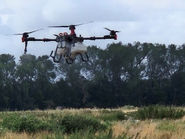The productive use of wet and rewetted peatlands
Paludiculture, or wetter farming, is the practice of growing crops that are suited to wetland conditions, often peatland. By carefully changing existing land drainage to raise the water table, these crops can then be farmed, ensuring the land remains financially viable.
Draining water from peatlands causes the carbon that was locked up in the peat to oxidise and be released into the atmosphere as carbon dioxide. The restoration of a higher water table and rewetting the peat locks the carbon in the peat and significantly reduces the greenhouse gas emissions.
For a further introduction to paludiculture read the Natural England blog “Paludiculture – the future of farming on peat soils?“ and the The Lancashire Wildlife Trust "What is wetter farming?" blog post.
For a more comprehensive appraisal of paludiculture:
A guide to support the practical implementation of paludiculture systems
Managing for a sustainable future: Cropping systems on drained lowland peat (pdf)
Impacts of paludiculture on the natural environment: a scoping report (pdf)
News






Videos
Talking Paludiculture
The Talking Paludiculture vlog is hosted by Megan Hudson (Fenland Soil), (https://vimeo.com/showcase/talking-paludiculture-pod). The podacasts are hosted by Elizabeth Stockdale (Niab). A new episode will be published every second week.
Exploring new approaches to willow growing under paludiculture conditions
Nicola Coates – Coates English Willow, and Fi Holder – FWAG SW and beef farmer on the Somerset Levels and Moors
On-farm development and trials of willow production systems
Re-invigorating old systems of production under wetter conditions
Changing weather patterns and reducing resilience of current systems
Co-delivering flood risk management together with production systems
Limited information and availability of green finance options
Farmer experiences of farming and grassland management in the Somerset Levels
Cultural heritage and history in willow systems
Role of grant schemes and their constraints alongside developing business options
Experiences in the Lancashire Mosses (3)
Tim Parfitt – Beadmoss, producers of sphagnum plugs and seed, Kathryn Wright – Wright Farm Produce, and Cameron Edwards – arable farmer on peat
Building on experience with the carbon farm – a rewetted area with management that is actively seeking to build peat again in the landscape
Opportunities to integrate paludiculture into arable and horticultural systems on peat soils
Innovators and farmers sharing experiences and their desire to grow ‘something’ and produce crops for a range of uses
Useful publications

A guide to support practical implementation of paludiculture systems
This guide is intended to provide guidance and support for the conversion of land and farms to paludiculture and is primarily aimed at farmers and owners of peatland who are considering or already planning this conversion. The aim of the guide is to summarise current knowledge and present the individual steps needed for conversion clearly.
A translation of the Leitfaden Fur Die Umsetzung Von Paludikultur
2025

Design Guide to Support Water Table and Water Resource Management in the Broads National Park
The Broads Authority have worked with the Environment Agency to develop a design guide to help interested farmers and landowners plan and implement watertable management strategies. The guide focusses on the typical policy, constraints, and opportunities for water supply, water level management and the permissions required for the restoration of degraded lowland peat
Broads Authority
2025

Environmental Improvement Plan 2025
The UK government’s Environmental Improvement Plan (EIP) 2025 sets out an ambitious vision: restore nature, clean up air and water, tackle climate change, and ensure everyone can enjoy the benefits of a thriving environment. This isn’t just about conservation—it’s about building resilience, boosting health, and driving economic growth.
UK Government
2025

Impacts of paludiculture on the natural environment: a scoping report
Impacts of paludiculture on the natural environment: a scoping report focussing on English lowland peat landscapes and providing an overview of:
observed and potential impacts of paludiculture on the natural environment, specifically soils, hydrology, water quality, biodiversity, and landscape character and heritage,
management options to minimise negative and maximise positive impacts,
open research questions and knowledge gaps related to these impacts, and
strengths, weaknesses, opportunities and threats related to paludiculture and its impacts on the natural environment.
Taylor NG & Stockdale EA
2025
More paliudiculture resources can be found here>>












